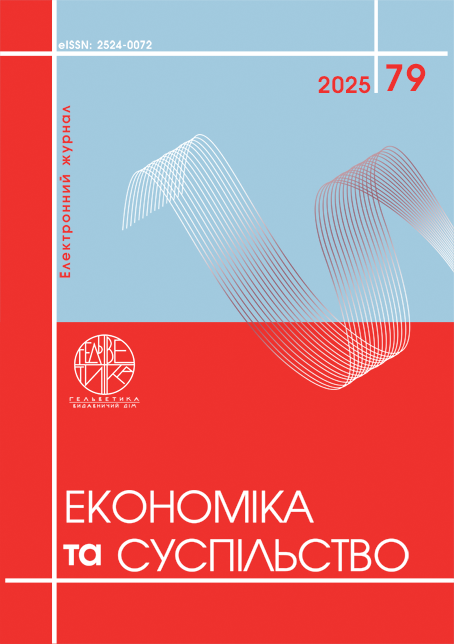INNOVATIVE PROFESSIONAL TECHNOLOGIES AS A FACTOR OF DIGITAL MODERNIZATION OF ACCOUNTING
Abstract
The article examines the impact of innovative professional technologies on the digital modernization of accounting. It defines digital transformation as a comprehensive process of methodological, organizational, and technological renewal that integrates accounting, analytical, and management systems into a unified digital environment. The study emphasizes that innovation in accounting goes beyond automation, forming a new paradigm based on intelligent data management and real-time analytics. Key attention is given to the role of technologies such as artificial intelligence (AI), machine learning (ML), cloud computing, blockchain, and Big Data analytics. These tools enhance the accuracy, transparency, and analytical depth of accounting information. AI and ML help classify transactions, detect anomalies, and forecast financial outcomes. Blockchain provides transparency and data immutability, while cloud services ensure data availability and security across different organizational levels. The research identifies methodological principles that ensure the effectiveness of digital accounting systems: integration, transparency, automation, flexibility, continuity, and security. Their implementation supports coherence and adaptability of accounting processes and minimizes human errors. The digital transformation also changes the accountant’s professional role – from a document registrar to a data analyst and strategic consultant who applies analytical systems and predictive tools for decision-making. The study outlines the main benefits of implementing innovative technologies in accounting, including operational efficiency, improved data accuracy, analytical capabilities, cost optimization, and better financial transparency. However, it also notes challenges such as high implementation costs, cybersecurity risks, the need for staff training, and limited standardization of digital processes. Addressing these issues requires comprehensive planning, enhanced digital competencies among accountants, and the establishment of cybersecurity standards. In conclusion, innovative professional technologies serve as a driving force of accounting modernization. Their integration creates an intelligent and secure digital ecosystem that improves the reliability of financial information, supports informed decision-making, and enhances the strategic management of enterprises in the digital economy.
References
Білоус О., Кундеус О. Трансформація бухгалтерського обліку в умовах цифрової економіки. Галицький економічний вісник. 2023. № 4(83). С. 56-61. DOI: https://doi.org/10.33108/galicianvisnyk_tntu2023.04.056
Лега О.В., Прийдак Т.Б., Яловега Л.В., Мокієнко Т.В., Ліпський Р.В. Інноваційний підхід до автоматизації обліку: аналіз програмних рішень для бізнесу. Здобутки економіки: перспективи та інновації. 2025. № 16. DOI: https://doi.org/10.5281/zenodo.15024092
Лемішовська О.С., Ходоровський В.Г. ІТ-технології в розвитку облікової методології. Економіка та суспільство. 2022. Випуск 36. DOI: https://doi.org/10.32782/2524-0072/2022-36-16
Мацків О.І. Інформаційні технології бухгалтерського обліку в умовах діджиталізації. Науковий вісник Одеського національного економічного університету. 2023. № 11-12. С. 67-75. DOI: https://doi.org/10.32680/2409-9260-2023-11-12-312-313-67-75
Руденко С.В., Погрібняк Д.С. Бухгалтерський облік в умовах цифровізації. Вісник Хмельницького національного університету. 2021. № 1. С. 265-269. URL: https://journals.khnu.km.ua/vestnik/wp-content/uploads/2021/07/2021-1-ЕН-46.pdf
Шишкова Н.Л. Перспективи IT-модернізації бухгалтерського обліку: актуалізація теорії і практики. Економіка підприємства. 2019. № 3. С. 146-159. DOI: https://doi.org/10.33271/ev/67.146
Bilous, O., & Kundeus, O. (2023). Transformatsiia bukhhalterskoho obliku v umovakh tsyfrovoi ekonomiky [Transformation of accounting in the digital economy]. Halytskyi Ekonomichnyi Visnyk, (4(83)), 56–61. https://doi.org/10.33108/galicianvisnyk_tntu2023.04.056
Leha, O. V., Pryidak, T. B., Yaloveha, L. V., Mokiienko, T. V., & Lipskyi, R. V. (2025). Innovatsiinyi pidkhid do avtomatyzatsii obliku: analiz prohramnykh rishen dlia biznesu [An innovative approach to accounting automation: analysis of software solutions for business]. Zdobutky Ekonomiky: Perspektyvy ta Innovatsii, (16). https://doi.org/10.5281/zenodo.15024092
Lemishovska, O. S., & Khodorovskyi, V. H. (2022). IT-tekhnolohii v rozvytku oblikovoi metodolohii [IT technologies in the development of accounting methodology]. Ekonomika ta Suspilstvo, (36). https://doi.org/10.32782/2524-0072/2022-36-16
Matskiv, O. I. (2023). Informatsiini tekhnolohii bukhhalterskoho obliku v umovakh didzhytalizatsii [Information technologies of accounting in the conditions of digitalization]. Naukovyi Visnyk Odeskoho Natsionalnoho Ekonomichnoho Universytetu, (11–12), 67–75. https://doi.org/10.32680/2409-9260-2023-11-12-312-313-67-75
Rudenko, S. V., & Pohribniak, D. S. (2021). Bukhhalterskyi oblik v umovakh tsyfrovizatsii [Accounting in the conditions of digitalization]. Visnyk Khmelnytskoho Natsionalnoho Universytetu, (1), 265–269. Retrieved from https://journals.khnu.km.ua/vestnik/wp-content/uploads/2021/07/2021-1-ЕН-46.pdf
Shyshkova, N. L. (2019). Perspektyvy IT-modernizatsii bukhhalterskoho obliku: aktualizatsiia teorii i praktyky [Prospects for IT modernization of accounting: updating theory and practice]. Ekonomika Pidpryiemstva, (3), 146–159. https://doi.org/10.33271/ev/67.146

This work is licensed under a Creative Commons Attribution 4.0 International License.


